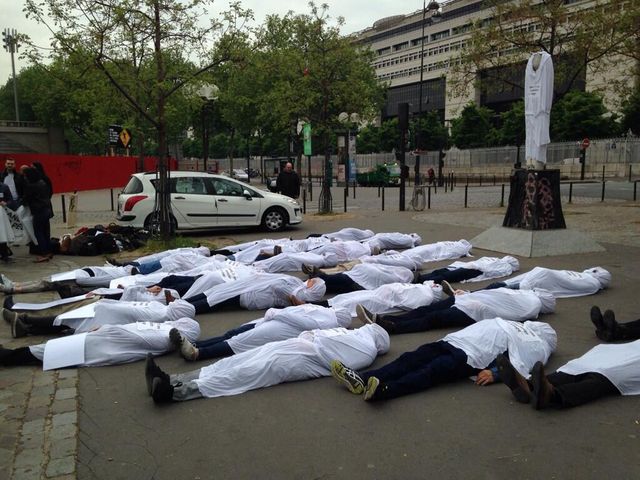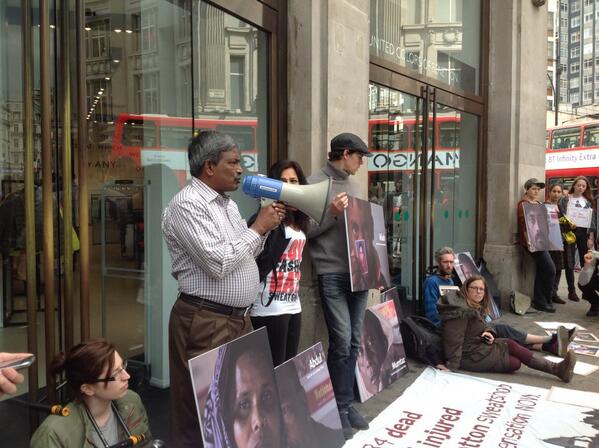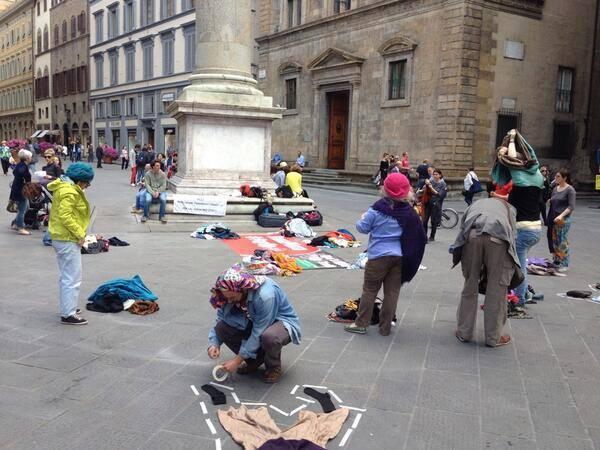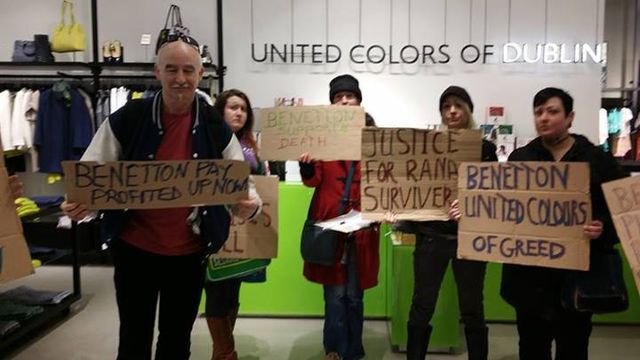Benetton shops were closed across Italy, England, Ireland, France and Turkey by campaigners demanding that they pay into the compensation fund for the victims and their families. Benetton's flagship store in London lost an entire day of trade as protesters locked themselves to the doors for ten hours. [
 http://www.redpepper.org.uk/protest-tells-benetton-to-pay-up-for-rana-plaza-victims/] “We don't think that Benetton should be making a profit in London on the anniversary of the collapse of Rana Plaza.” said Martha Jones, one of the protesters. The London store manager initially claimed that the company had paid compensation, but later retracted this, saying that she had been lied to by her superiors. In Dublin campaigners also closed a Benetton shop with a number of protesters occupying the shop with placards demanding justice for the survivors and condemning Benetton's actions.
http://www.redpepper.org.uk/protest-tells-benetton-to-pay-up-for-rana-plaza-victims/] “We don't think that Benetton should be making a profit in London on the anniversary of the collapse of Rana Plaza.” said Martha Jones, one of the protesters. The London store manager initially claimed that the company had paid compensation, but later retracted this, saying that she had been lied to by her superiors. In Dublin campaigners also closed a Benetton shop with a number of protesters occupying the shop with placards demanding justice for the survivors and condemning Benetton's actions. In Italy, the home of Benetton, multiple shops were targeted by flash mobs, including in Florence, Milan and Treviso. Similar actions were carried out in France and Turkey.
The call out for Europe-wide action came from the Clean Clothes Campaign. Ineke Zeldenrust of the CCC said that Benetton, and other firms who have not contributed to the fund “have killed twice. They neglected the safety of the the workers who supply them, and now they are abandoning the survivors and the families of those who lost their lives.” European MEPs added their voice to the protests with a letter calling on Benetton and other Europe-based corporations to “publicly contribute a significant amount to the Rana Plaza Donor’s Trust Fund, an amount that will be sufficient to ensure each and every family received the payments they are owed.” [
 http://www.socialistworld.net/doc/6751]
http://www.socialistworld.net/doc/6751] Benetton was chosen as a target because they have not contributed any money to the compensation fund, and have remained completely silent on the disaster, other than to make excuses and deny responsibility. They initially denied using the factory, but when their labels were found in the wreckage they had to admit a connection. They then claimed that it was a one-time order, and that this meant they have no responsibility to the victims. [
 http://www.dailykos.com/story/2013/05/01/1206113/-Meet-the-retailers-that-won-t-help-victims-of-Bangladesh-factory-collapse] They are now arguing that they have contributed, by handing out some prosthetic limbs, providing 'skills training' and offering loans to those affected. These gestures are a long way from meaningful compensation.
http://www.dailykos.com/story/2013/05/01/1206113/-Meet-the-retailers-that-won-t-help-victims-of-Bangladesh-factory-collapse] They are now arguing that they have contributed, by handing out some prosthetic limbs, providing 'skills training' and offering loans to those affected. These gestures are a long way from meaningful compensation. Furthermore an Italian documentary uncovered evidence, only months after the Rana Plaza collapse, that Benetton was continuing to source clothes from factories with underage workers, locked gates and no fire escapes. Benetton claimed not to 'recognise' these factories. [
 http://www.thehindu.com/news/international/south-asia/bangladesh-garment-workers-still-vulnerable/article5950981.ece]
http://www.thehindu.com/news/international/south-asia/bangladesh-garment-workers-still-vulnerable/article5950981.ece] 




Comments
Hide the following 8 comments
What a great idea
26.04.2014 19:20
The blood is just as much on your hands, friends, on all of our hands. It isn't SIMPLY the evil capitalist merchants who are the exploiters here.
MDN
Italian Documentary used secret camera to record Benetton managers in Bangladesh
26.04.2014 21:31
Shafiur Rahman
 e-mail:
shafiur@gmail.com
e-mail:
shafiur@gmail.com
 Homepage:
http://srdocs.net
Homepage:
http://srdocs.net
action in Berlin too
27.04.2014 11:53
Rana
Myth 1: Exploitation is the fault of consumers.
27.04.2014 12:04
Reading most of the dialogue around Rana Plaza feels like being sat at a pantomime with everyone looking unawares in one direction whilst the evil villain creeps up behind them. Much of the media is acting as an echo-chamber for Governments who blame the weakest members of society to hide their own wrongdoings.
In the UK the wrong people are blamed for the economic crisis, the finger is pointed at asylum seekers and people on benefits rather than tax dodging corporations and the banking sector that caused the crisis. In fashion, fourteen year old Primark customers are blamed for the existence of sweatshops instead of the corporations that force such low wages onto people, and instead of capitalism – an economic system with exploitation and profit in its very DNA.
kjn
I think both are to blame
27.04.2014 16:21
However, until they do that, they should be boycotted.
Rich
Try reading what I wrote and THINKING
28.04.2014 13:26
I was NOT saying that these corporations had no blame in the matter.
But I was saying that we consumers most certainly shared in that blame by OUR choices. BE HONEST! Do YOU look at the label of origin? Do YOU buy the lowest priced alternative regardless of the conditions under which it was produced? Are YOU willing to pay somewhat more, possibly a lot more, to have garments produced by workers whose pay is higher, whose working conditions are better, etc.
I'm saying that the blood is on all of our hands.
Yes of course, these companies could pay more out of their profits, out of theiri pockets, to improve the lot of these workers. But YOU could be paying more out of your pockets too. Of course I don't mean YOU as much as WE. I'm part of this too. But at least I am willing to face responsibility for the choices that I make.
MDN
crystal balls
07.05.2014 21:52
I notice that this article points the finger "in hindsight"
It would of been helpful if you lot had forewarned the company that the building was going to collapse BEFORE it happened. That way, they could of done something about it.
If you didn't know it was going collapse, then I guess you are as much to blame as this clothing company; because they probably didn't know it was going to collapse either!
mail me
Why not pressure the government of Bangladesh?
09.06.2014 18:38
One obscure part of this which I don't really understand is how Bangladeshi factory ownership is proved and how factory inspectors and trades unions work, so I won't pretend to be an expert, but that's an obscure example of how laws and government can help people not be squashed.
Looking at comments in this thread...
I think that country of origin labels are important, so that people can look-out for clothes made in countries that are probably democratic welfare states, and feel good in them even if the clothes aren't quite the most rapidly-changing in style or cheapest or available closest to home. And...
I think the Bangladeshi government has got-off very lightly here. They are the ones diverting money from public services into export subsidy. They are the ones who ought to pass practical laws, at least, about factory inspections and make sure that the law works in practice. They are the ones who have negotiated tariff-free access to EU markets, allowing their citizens to sell in unfair competition next to producers who pay taxes towards a welfare state.
https://facebook.com/planB4fashion - John R
 e-mail:
brittaniabuckle@yahoo.co.uk
e-mail:
brittaniabuckle@yahoo.co.uk
 Homepage:
https://facebook.com/planB4fashion
Homepage:
https://facebook.com/planB4fashion